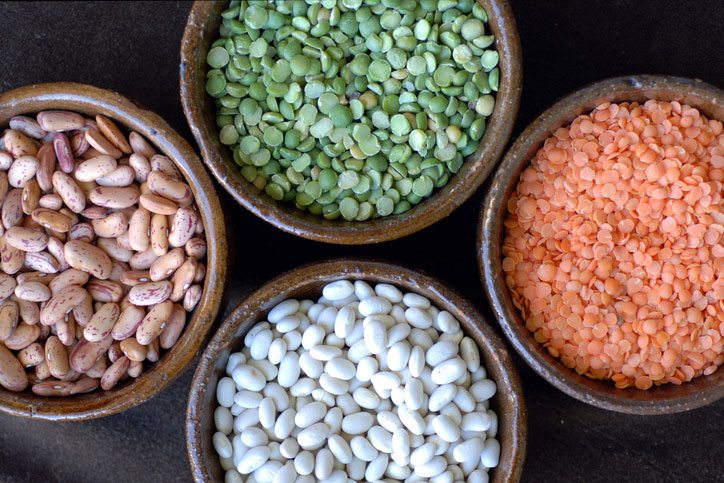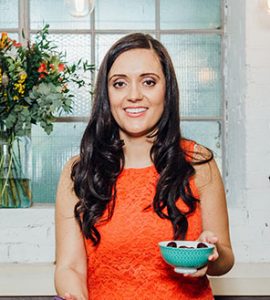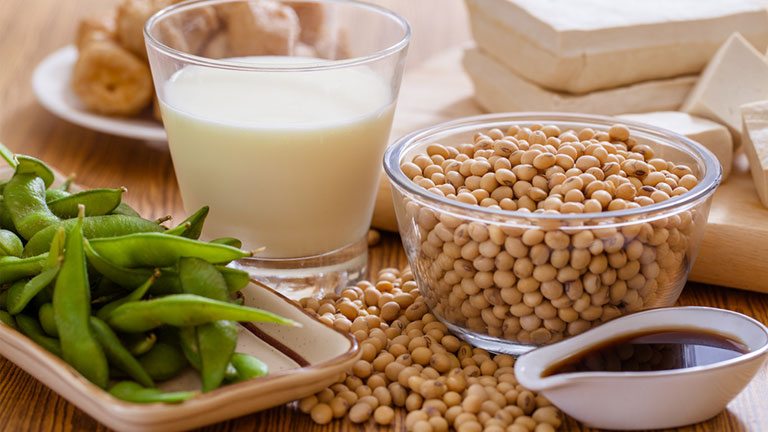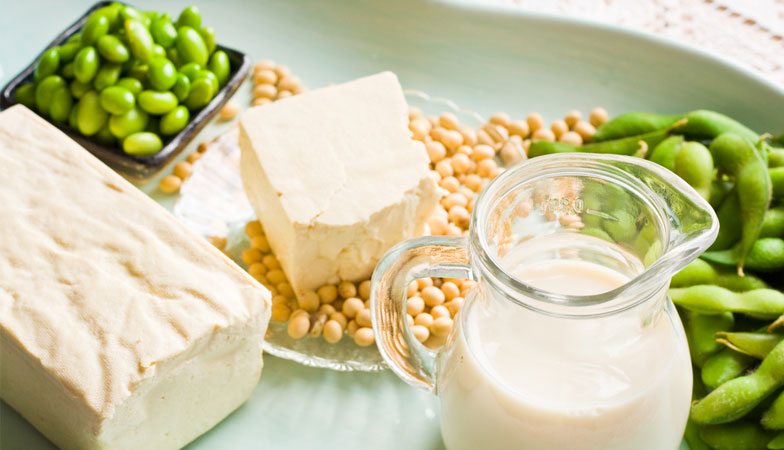Once touted as a wonderfood, soy’s healthy benefits are now in question. We asked nutritionist Angelique Panagos – is soy bad for you?
Hitting the headlines every few weeks, soy is a controversial foodstuff. The latest news? The Food and Drug Administration has withdrawn its claim that soy can prevent heart disease saying there isn’t enough evidence to prove soy’s previous claim that it can. It’s not the first time that soy has yo-yo’ed in and out of favour. With worrying news stories that have even referred to the product as ‘poison’, it’s understandable that we’re left feeling both confused and a little unsure whether we should be putting it into our mouths at all. To set the record straight on soy, we spoke to nutritional therapist Angelique Panagos
What is soy anyway?
Hailing from Okinawa, Japan, soy has been around for centuries. ‘Okinawa is supposed to be one of the healthiest places on earth. It’s part of the blue zone which is an area where they have low rates of cancer and heart disease and the longest living people’ explained Panagos. And while soybeans emigrated to the United States in the 1700s it wasn’t until recently that the food has really taken off in the West. In the past ten years, Panagos says that it’s been showing up increasingly on her radar. ‘Soy is a bean and it’s a source of plant protein’, explains the health expert. And this is why with the increase in vegetarians, vegans and flexitarians the food product has shown increasing popularity over recent years with half a million vegans living in the UK alone and sales of Alpro Unsweetened Almond Milk rising by 1500 percent cent since 2015. And when 100 grams of raw soybeans contain 36g of protein it’s plain to see how meat and dairy alternatives have become popular for anyone trying to up their protein content without the addition of meat, eggs or dairy.
So where do we find it? ‘Nowadays soy is in a lot of different types of food. From soy sauce (that you dip your sushi in to tamari (a gluten-free type of soy sauce, miso (stock made from fermented soy beans) and edamame beans. It’s found in natto, a kind of fermented soy (a bean eaten in Asia as a breakfast food, it’s described as an acquired taste as it has a powerful smell, strong flavour and slimy texture) as well as tempeh or tofu.’ But it’s not just in these more obvious places that soy can be discovered. ‘It can hide in a host of processed foods. For example, you’ll find soy sauce in a lot of ready meals, it has a salty taste which is why it’s often used to add flavour.’
What are the benefits of eating soy?
Some studies hail soy as a superfood. From improving cardiovascular health and promoting weight loss to the prevention of certain cancers a lot of the research is not definite. But Panagos explained that there are some nutritional benefits that mean we maybe shouldn’t be so quick to write it off. It’s packed with both protein and fibre but can also help us in other ways too.
It’s good for your gut
‘Eating fermented soy such as that found in miso, tempeh and natto can come with benefits. Fermentation helps improve gut health and has a prebiotic and probiotic effect. Basically, it helps us to build up our gut flora which is essential for the smooth running of our entire systems. Hippocrates said that ‘disease begins in the gut’ and if that’s where it begins then that is where health begins too. Our gut flora is essential for our immune system, our mood and the ability to absorb nutrients and to keep us healthy.’
Healthista loves Clearspring’s fermented soy instant white miso paste, available for £2.49 here.
It can help with bone health
‘Soy is high in vitamin K2 which is important for your bones and joints. We often don’t get enough of this vitamin especially if we don’t eat very many leafy green vegetables. There’s also a lot of research showing that vitamin K2 can be helpful for our immune system too.’ Some studies have even suggested that vitamin K2 is more useful to fight off osteoporosis and bone problems than calcium.

It could help balance out your hormones
And while the biggest fear about soy comes from its link to hormones, it doesn’t mean the impact is always negative. ‘Soy products contain very weak plant oestrogens called phytoestrogens that can have an effect on your hormones.’ A phytoestrogen is a bit like human estrogen but in a weaker form and while more studies are needed to draw concrete conclusions. Some research carried out in 2009 showed that American women given isoflavones (a type of phytoestrogen) showed reduced risks of breast cancer recurrence. ‘As long as it’s in its natural form, bringing some soy into the diet isn’t bad. Some women say it reduces hot flushes during menopause and others say that it brings them on. It’s all about using what works for your body… we’ve seen in certain cultures such as with the Okinawans that they have fewer cases of breast cancer but we need to be eating it in the form that they’ve been eating it – natural and non-processed otherwise there are potential risks.’
Healthista loves Biona’s organic plain tofu, available for £3.69 here.
Is soy dangerous?
While some research shows eating soy could give hormones a helping hand, confusingly, Panagos explains there is potential for things to go the opposite way.
Yes, it may be harmful for your hormones
‘Soy does have an oestrogenic effect on the body so if you’re eating a lot of it then it can also increase your hormonal imbalances,’ says Panagos. ‘It mimics the oestrogens within the body so for some people, particularly women that are going through the menopause, it can cause problems. When we’re menopausal, the body starts to naturally shut down the production of oestrogen. If we’re taking in a lot of phytoestrogens as well, it could further exacerbate hormonal flux.’ Basically, while women in some studies found an easing of hot flushes and menopausal symptoms (this 2001 study found that consumption of soy has a protective effect against them), other studies proved that it made little difference or even made things worse. If you think that’s confusing, it’s because it really is. And to make it even more difficult to wrap your head around, these same hormones have been linked both to increased risk of breast cancer AND a decreased risk. BreastCancer.org states that eating soy may turn on genes linked to cancer growth while Cancer Research UK claims that there is no strong link between soy and any type of cancer – with one surprising exception. According to the charity, ‘some studies have shown that diets high in soy could reduce the risk of prostate cancer, but it’s not clear if this is really the case.’ In fact, the latest research from the University of Arizona Cancer Center in Tucson has suggested that soy may even be able to help stop the development of breast cancer tumours – it really is difficult to know what to think. When it comes to soy and cancer it seems there is still a lot of research to be done.
It’s highly allergenic
According to Panagos, hidden soy products in processed foods could be causing problems. ‘Soy is a highly allergenic food. Alongside foods like gluten, wheat, dairy and corn, there are people that are sensitive to it. When some people eat soy they get extremely bloated, have stomach problems, headaches or skin reactions. If you’re having a lot of gut issues it’s important to look at your entire diet because we’re all biochemically individual – one person might be able to handle eating soy a few times a week whereas someone else may not.’
Beware of processed soy
Panagos explained that the biggest problems with soy arise when we consume foods that are heavily processed. ‘Most soy milk has thickening agents and sweeteners. In processed soy products we have taken away all of soy’s natural abilities to help us and we’ve gotten rid of the fermentation process. We often opt for a massive soy latte and assume that because it’s made from soy it’s fine.’ Other processed soy products to look out for include soya yoghurts, burgers, sausages and cheeses. The nutritionist also warns that soy is also quite commonly genetically modified, ‘if we get something that’s filled with insecticides and pesticides that’s going to have a knock-on effect on our own immune system. I personally think we should limit these foods until there’s enough evidence to suggest they are safe to eat.’
It’s important to check the labels of your food but these labels might not always say the word soy. If you want to avoid ALL soy look out for; cold-pressed, expelled or extruded soy oil, edamame, miso, natto, shoyu, soy albumin, soy sprouts, soya, soybean curd or granules, soy protein concentrate, hydrolyzed or isolate, tamari, tempeh, textured vegetable protein (TVP) and tofu.

It may affect mineral absorption
Processed soy could also be affecting our absorption of essential minerals. ‘Soy is naturally high in something called phytic acid and that can affect mineral and protein absorption. It’s referred to as an anti-nutrient as it makes it very hard for you to absorb nutrients. However, in the fermenting process, the phytic acid actually deactivates so the minerals are easier for us to absorb.’ Vegans will be pleased to hear that while tofu isn’t a fermented soy product, the production process does deactivate the phytic acid, making it a healthier way to consume soy. ‘I’m not saying if you have one soya milk latte you’re not going to absorb any of the nutrients you eat in that whole day but it’s about what we’re doing on an everyday basis.’
3 rules to follow when you’re eating soy
Don’t overdo it
‘When soy is used in traditional Asian cultures, it’s not the main part of the meal, it’s more like a condiment and there are a lot of other food sources in that meal.That’s where we go wrong in Western culture – we don’t have a little bit of everything on our plate, we have a lot of one thing. Even if you’re following a paleo diet you should be having a lot of vegetables and some meat as opposed to a slab of meat on your plate.’ The nutritionist advises limiting soy consumption to around two times a week. ‘It’s all about balance. If you’re having different types of soy, say one day you have miso and another you have tempeh or natto then maybe you could have these up to three times a week but it’s not something you should focus your diet around.’
Avoid using soy as your main source of protein
Of course, the people who are consuming the most soy are vegetarians and vegans. So can they be eating lots of soy to fill a protein quota? ‘It shouldn’t be your main source of protein. It needs to form part of a healthy diet and you shouldn’t be eating too much of any food. If you want to be a vegan or vegetarian, you want to be a smart vegan or vegetarian. You need to make sure you’re eating a variety of foods.’ And for those that aren’t eating meat or eggs, Panagos explained that consuming a variety of protein sources is extra important. ‘Animal sources of protein contain all nine essential amino acids that are essential to the way that our body functions. But very few vegetarian protein sources contain all of these amino acids. So when we’re vegan we need to make sure we have a good variety of foods that bring protein in.’

Make the right soy choices
Rather than opting for sugar-packed and overprocessed soy milk and yogurt, choose tempeh, natto or miso as your soy source. Panagos also advises choosing organic foods wherever possible so that you know that pesky pesticides and insecticides haven’t touched your grub. ‘If we’re going to have soy, we want to have it as fermented soy that is organic. Not all soy is created equal and we should really be avoiding the processed stuff.’
WE HAVE A LOT OF MISO, SOYA BEANS AND LENTIL PRODUCTS IN THE SHOP, PLEASE MAKE SOME SUGGESTIONS THROUGH COPY.

Read more
15 best vegan food options on the high street
10 new vegan protein powders that pass the taste test
3 MINUTE vegetable tofu stir-fry
8 healthy food essentials for the UK’s hottest vegan couple
Like this article? Sign up to our newsletter to get more articles like this delivered straight to your inbox.






















































